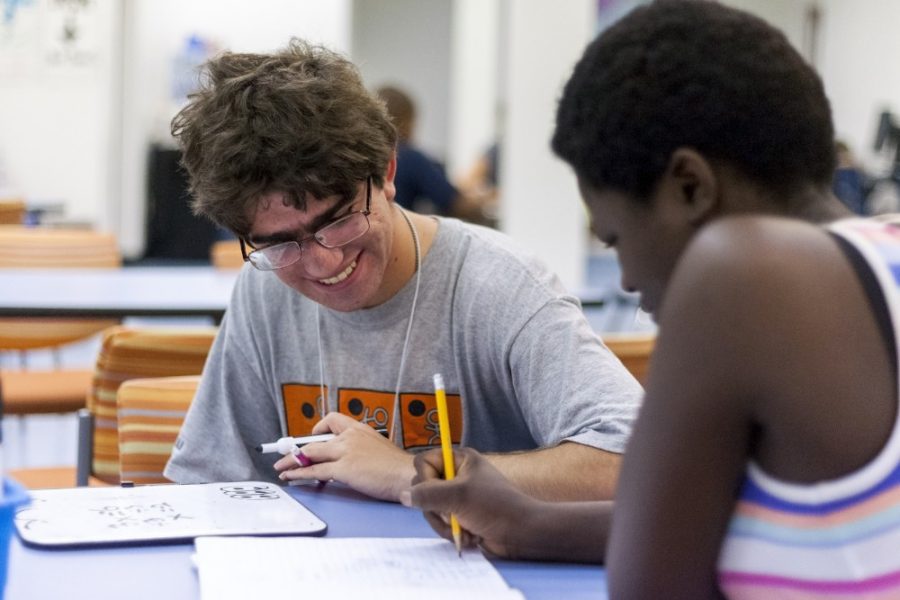With the backdrop of the greatest global refugee crisis in over 70 years, projects like the Collaborative Engagement to Nurture Talent and Educate Responsively represent increased efforts by western nations to help resettle families fleeing from their native countries.
On Aug. 31, the storefront at 55 N. Sixth Ave. in downtown Tucson became the location of the opening for CENTER.
CENTER stems from a larger Arizona resettlement agency called Refugee Focus, whose efforts to effectively integrate refugee families in Tucson goes back to 2003. Rather than focusing on the entire family, CENTER’s primary goal is educating and tutoring children with refugee parents.
The program is still in its early stages and relies mainly on volunteer work from the community. Its only full-time employee is Julie Kasper, who oversees the building in downtown Tucson.
Kasper, who grew up in Tucson, has been attracted to the intellectual challenges of language and cultural barriers throughout her career.
“I knew I wanted to be a teacher, but I wasn’t impressed with the College of Education at the UA,” she said.
After moving to New York City, she got her master’s degree in teaching English as a second language at Teacher’s College in Columbia.
Her work with refugees spans back to 2005 when she returned to Tucson from Queens in New York City to take a job at Catalina Magnet High School. She soon discovered that most of their international students happened to be refugees.
In 2014, Kasper left Catalina Magnet High School to pursue work that could more effectively address refugees’ needs for education and developmental assistance. That’s when she began work with CENTER’s parent organization, Lutheran Social Services of the Southwest. She started as the school coordinator of the organization’s Refugee School Impact Grant.
“After talking with parents, kids, teachers and community partners throughout Tucson, the immediate needs that arose were after-school tutoring. Where is a consistent place my kid can go to get help?” Kasper said.
The lack of professional developmental help for refugee students was what led to the creation of CENTER.
“The big focus of CENTER is on school enrollment,” said Connie Phillips, the CEO and president of LSS-SW. “It’s focused on more effectively educating the children. Some of them have not been in school, or have gone to school camps with little resources. Some don’t speak English.”
In order to properly identify and assist refugee families from nations like Somalia, the Democratic Republic of the Congo, and Iraq, LSS-SW is contracted with national groups that work with the U.N. These groups, like the Church World Service or Episcopal Migration Ministries, look over applications for resettlement from people in refugee camps.
“When they get here, we already know they’re refugees, which is an official status determined by the [United Nations] High Commission on Refugees,” Phillips said.
Once the refugees are identified, groups like LSS-SW send out case managers to help provide educational, medical or trauma needs. This is where CENTER comes in to offer day-care, tutoring, English instruction and other developmental services to help provide an effective education.
“The main age group we focus on is between 12 and 24 years old,” Kasper said. “We want to provide the skills and support so that they can be successful members of a community while also maintaining their home language and culture.”
Kasper describes her work as challenging, pointing out delays and logistical obstacles to the “soft launch” of CENTER on Aug. 31. But she says there’s no shortage of rewarding experiences when helping refugee families resettle.
“These are kids that have been through so much, they’re so resilient,” Kasper said. “It’s amazing to see the growth of relationships between volunteers from the [UA] and the children in just a week and a half.”
One volunteer, Marisa Latinka, a fifth-year global senior at the UA, says her experience in helping Congolese refugees obtain a GED is unlike any tutoring experience she’s had in the past.
“Sometimes, the language barrier can be very difficult,” Latinka said. “But I’ve always known that tutoring people in difficult material is something I can learn from; and it’s an even more enjoyable experience when you’re helping people acclimate to a completely different culture.”
Follow Isaac Rounseville on Twitter.









